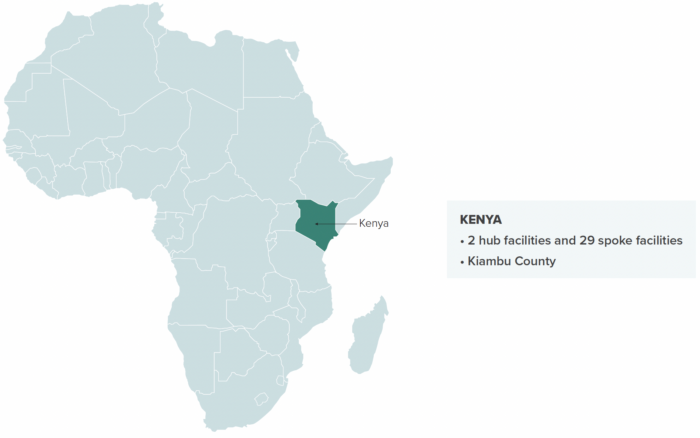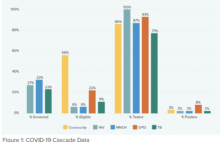Overview
The Elizabeth Glaser Pediatric AIDS Foundation (EGPAF) is implementing the Catalyzing COVID-19 Action (CCA) project, a FIND, and UNITAID-funded initiative responding to the global COVID-19 pandemic. Critical gaps along the COVID-19 cascade concerning access and utilization of screening, testing, and effective therapeutics in managing the disease remain, particularly in low- and middle-income countries (LMIC). Since October 1, 2021, EGPAF has been working to accelerate end-to-end access to novel solutions in responding to the COVID-19 pandemic through testing, isolation, care, and treatment approaches adapted to meet the needs of LMICs. The CCA project has a cost extension through December 30, 2023, to implement in Kenya, Zimbabwe, and Cameroon.
The Problem
Since it was first reported, SARS-CoV-2 has continued to evolve, with each variant having different transmissibility, disease severity, or effect on the efficacy of diagnostics, vaccines and treatment. Each of the new variants, in the ongoing COVID-19 pandemic, requires health systems, implementing partners, governments, and donors to respond with rapid, adaptable public health measures for screening, testing, isolation, care, and treatment services.
Project Goal and Objectives
The goal of the CCA project in Kenya is to accelerate end-to-end access to novel solutions in responding to the COVID-19 pandemic through testing, isolation, care, and treatment approaches adapted to meet the country’s needs. The specific objectives aimed at realizing the above goal include:
i. Evidence generation on acceptability, feasibility, and effectiveness of COVID-19 services and delivery models
ii. Catalytic implementation, supply chain, and strengthening of COVID-19 solutions within existing health system platforms
iii. Advocating for an enabling policy environment, guideline development, and regulatory approval to accelerate access to effective test and treat solutions
iv. Demand creation for increased access to COVID-19 services, including linkage to vaccination
v. Transition and scale-up through linkages to national programs and other funding sources
Project Map
In Kenya, the CCA project is implemented in two hub facilities and 29 spoke facilities within Kiambu county.

Opportunity
In Kenya, the CCA project sees immense potential and opportunities yet to be tapped. Such include transitioning and scale-up beyond Kiambu County, leading the development of an emergency preparedness plan, and establishment of long COVID-19 clinics. Vaccination for COVID-19 remains an opportunity as the uptake is still low. Other opportunities include scale-up of the use of electronic systems, advocacy, health systems strengthening, and pandemic preparedness.
Key Outcomes
i. Improve access to diagnostics and therapeutics for COVID-19 by conducting testing, coordinating home isolation, and facilitating referral and admission of critical patients.

- Project donated approved antigen test kits to all facilities within the county to ensure constant access regardless of the upsurge/decline in numbers. Over one year of implementation, of those seen in HIV, TB, and MCH clinics, 19,708 were eligible for testing, and out of these, 17,592 (89%) were tested for COVID-19.
- Donation of personal protective equipment (gowns, gloves, and masks) as well as sanitizers, cleaning agents, and waste disposal items to support infection prevention measures during testing and screening
- Support screening, testing, and treatment services by contracting community health volunteers and lab technicians to support human resources. Figure 1 shows the programmatic COVID-19 cascade data in all health facilities in Kiambu county disaggregated by service delivery entry point for the period Jan 1, 2023 through December 31, 2022.
- Acquisition of therapeutics (e.g., 1,470 doses of Tocilizumab) for the management of severe COVID-19 that any facility/county can access within the country at no cost. This medication was previously inaccessible as it costs more than Ksh. 300,000 per dose. In some cases, patients required two doses, therefore, this outcome is a huge cost saving to the patient.
ii. Evidence Generation: Generated evidence on the effectiveness of integrating COVID-19 testing within MCH, HIV, and TB clinics.
- Over one year of implementation, 150,368 clients screened for COVID-19, showing an increased uptake for COVID-19 services within the county.
- Two research studies integrated within the project to monitor how COVID-19 services have been integrated as routine healthcare delivery services.
- Over one year of implementation, three success stories and two technical briefs were written on project activities and shared on various social media platforms. Topic areas include: stakeholder engagement, community outreach, community health volunteers utilized in a facility setting, and COVID-19 integration model.
- Digitization of COVID-19 patient records/data through the design and adoption of the Kenya electronic medical record (EMR) to capture COVID-19 information.
iii. Demand Creation: Conducted community sensitization on COVID testing, treatment, vaccination, and anti-stigma campaigns through community strategy structures and local civil society organizations.
- Community mobilization conducted through dialogue, outreaches, and mass testing campaigns.
- IEC materials were created and disseminated to increase the uptake of testing and treatment services.
iv. Enabling Environment: Facilitated regular review of national strategies, guidelines, and standard operating procedures through national technical working group meetings and their roll-out to counties and health facilities.
- Meeting Inter-religious Council of Kenya (IRCK) leadership team to discuss COVID-19 together with the Ministry of Health (MOH) Division of Health Promotion.
- Conducted health advocacy guidelines and policy meetings in collaboration with MOH and other strategic partners to finalize the Health Promotion Advocacy Guideline.
- COVID-19 Inter-Action Review (IAR) meeting with MOH Kiambu County to review the County’s COVID-19 response and adopt the lessons learned to develop the Post-IAR monitoring tool as the background for County’s Emergency Preparedness Plan.
Projected Outcomes
By the end of the project implementation period, the CCA Kenya project envisions assisting with fully integrating COVID-19 services within routine clinical care at clinics (i.e. HIV, TB, and MCH) and creating robust systems to respond to pandemics.
This project is made possible thanks to Unitaid’s funding and support. Unitaid accelerates access to innovation so that critical health products can reach the people who most need them.




